第四册Unit2_Housework_Lesson1
- 格式:ppt
- 大小:838.00 KB
- 文档页数:11
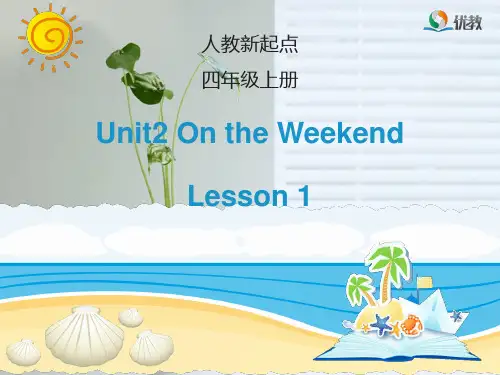
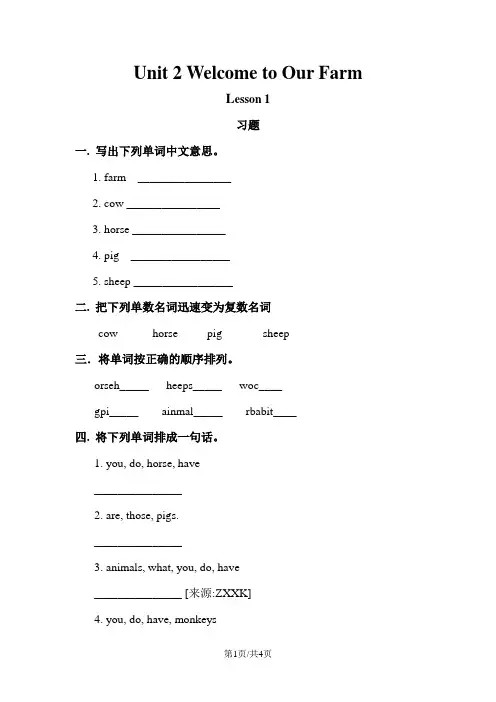
Unit 2 Welcome to Our FarmL esson 1习题一. 写出下列单词中文意思。
1. farm ________________2. cow ________________3. horse ________________4. pig _________________5. sheep _________________二. 把下列单数名词迅速变为复数名词cow horse pig sheep三.将单词按正确的顺序排列。
orseh_____ heeps_____ woc____gpi_____ ainmal_____ rbabit____四. 将下列单词排成一句话。
1. you, do, horse, have_______________2. are, those, pigs._______________3. animals, what, you, do, have_______________ [来源:ZXXK]4. you, do, have, monkeys_______________五. 讲下列句子排成完整的对话。
___ Welcome to our farm.___ Yes, we do.___ How beautiful!___ Do you have rabbits?六. 汉翻英。
1. 欢迎来到我们的农场。
2. 你们有猴子吗?3. 你们有什么动物呢?4. 这些是奶牛。
答案:一. 写出下列单词中文意思。
1. 农场2. 奶牛3. 马4. 猪5. 绵羊二. 把下列单数名词迅速变为复数名词cows horses pigs sheep [来源:][来源:] 三.将单词按正确的顺序排列。
horse sheep cowpig animal rabbit四. 将下列单词排成一句话。
1. Do you have horse?2. Those are pigs.[来源:学&科&网Z&X&X&K]3. What animals do you have?4. Do you have monkey?五. 讲下列句子排成完整的对话。
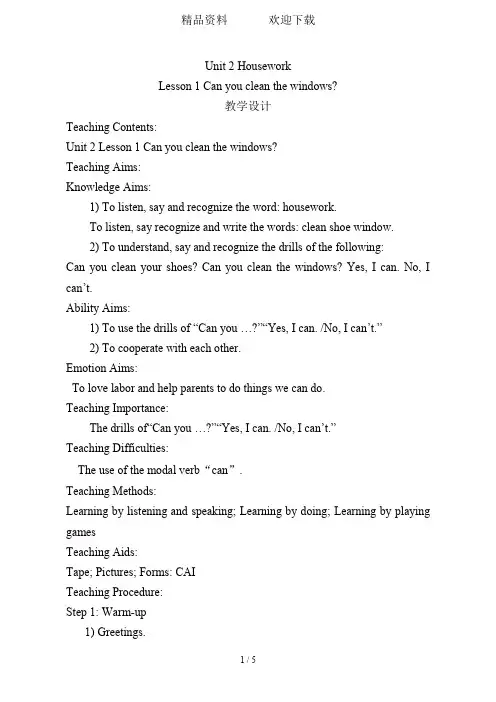
Unit 2 HouseworkLesson 1 Can you clean the windows?教学设计Teaching Contents:Unit 2 Lesson 1 Can you clean the windows?Teaching Aims:Knowledge Aims:1) To listen, say and recognize the word: housework.To listen, say recognize and write the words: clean shoe window.2) To understand, say and recognize the drills of the following:Can you clean your shoes? Can you clean the windows? Yes, I can. No, I can’t.Ability Aims:1) To use the drills of “Can you …?”“Yes, I can. /No, I can’t.”2) To cooperate with each other.Emotion Aims:To love labor and help parents to do things we can do.Teaching Importance:The drills of“Can you …?”“Yes, I can. /No, I can’t.”Teaching Difficulties:The use of the modal verb“can”.Teaching Methods:Learning by listening and speaking; Learning by doing; Learning by playing gamesTeaching Aids:Tape; Pictures; Forms: CAITeaching Procedure:Step 1: Warm-up1) Greetings.2) Play a game: I say, you do.play football / play basketball / play the violin / play the piano / sing/ draw pictures…[设计说明]教师让学生边说边做动作,复习学生已学过的动词词组,激发学生参与课堂学习的同时,唤起学生已有的相关旧知识、旧技能,让学生集中注意力,烘托课堂气氛,自然进入英语课最佳学习状态,为新课的顺利进行打好基础。
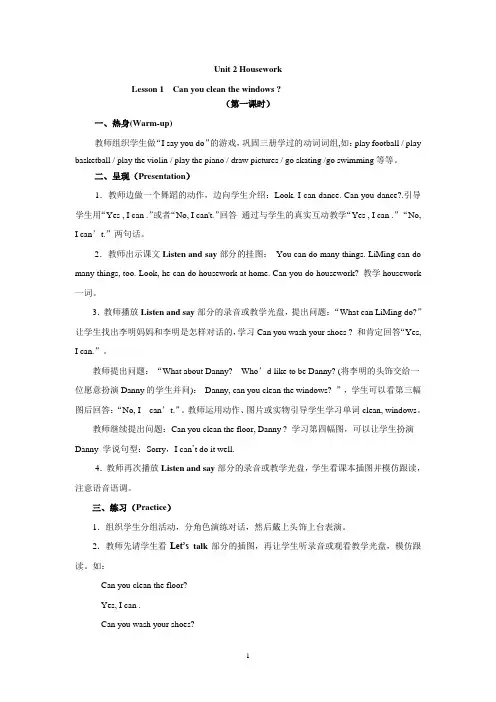
Unit 2 HouseworkLesson 1 Can you clean the windows ?(第一课时)一、热身(Warm-up)教师组织学生做“I say you do”的游戏,巩固三册学过的动词词组,如:play football / play basketball / play the violin / play the piano / draw pictures / go skating /go swimming等等。
二、呈现(Presentation)1.教师边做一个舞蹈的动作,边向学生介绍:Look. I can dance. Can you dance?.引导学生用“Yes , I can .”或者“No, I can't.”回答通过与学生的真实互动教学“Yes , I can .”“No, I can’t.”两句话。
2.教师出示课文Listen and say部分的挂图:You can do many things. LiMing can do many things, too. Look, he can do housework at home. Can you do housework? 教学housework 一词。
3.教师播放Listen and say部分的录音或教学光盘,提出问题:“What can LiMing do?”让学生找出李明妈妈和李明是怎样对话的,学习Can you wash your shoes ? 和肯定回答“Yes, I can.”。
教师提出问题:“What about Danny? Who’d like to be Danny? (将李明的头饰交给一位愿意扮演Danny的学生并问):Danny, can you clean the windows? ”,学生可以看第三幅图后回答:“No, I can’t.”。
教师运用动作、图片或实物引导学生学习单词clean, windows。
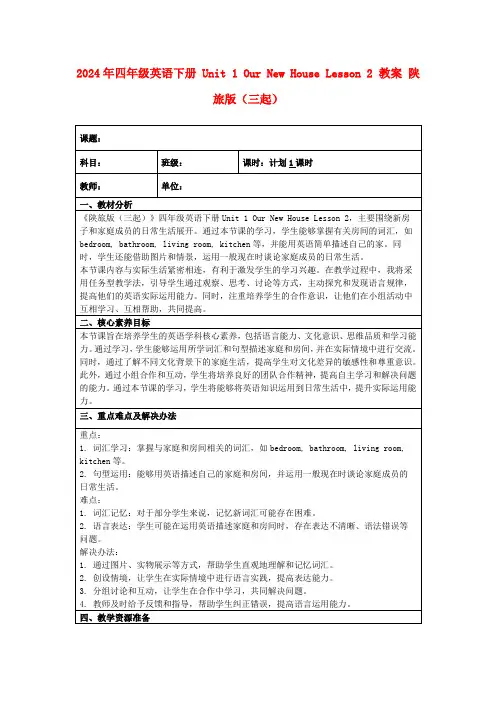
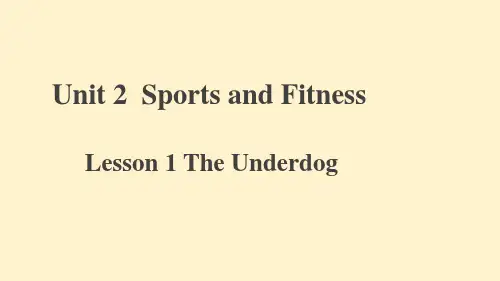
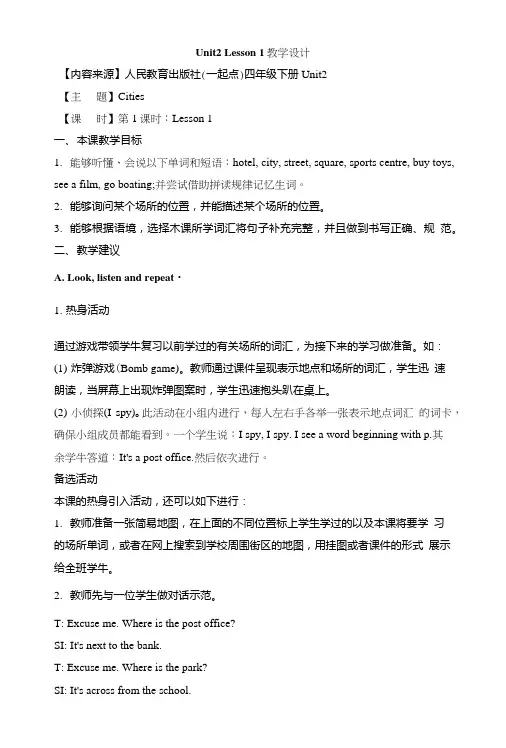
Unit2 Lesson 1教学设计【内容来源】人民教育出版社(一起点)四年级下册Unit2【主题】Cities【课时】第1课时:Lesson 1一、本课教学目标1.能够听懂、会说以下单词和短语:hotel, city, street, square, sports centre, buy toys, see a film, go boating;并尝试借助拼读规律记忆生词。
2.能够询问某个场所的位置,并能描述某个场所的位置。
3.能够根据语境,选择木课所学词汇将句子补充完整,并且做到书写正确、规范。
二、教学建议A. Look, listen and repeat・1.热身活动通过游戏带领学牛复习以前学过的有关场所的词汇,为接下来的学习做准备。
如:(1)炸弹游戏(Bomb game)。
教师通过课件呈现表示地点和场所的词汇,学生迅速朗读,当屏幕上出现炸弹图案时,学生迅速抱头趴在桌上。
(2)小侦探(I spy)o此活动在小组内进行,每人左右手各举一张表示地点词汇的词卡,确保小组成员都能看到。
一个学生说:I spy, I spy. I see a word beginning with p.其余学牛答道:It's a post office.然后依次进行。
备选活动本课的热身引入活动,还可以如下进行:1.教师准备一张简易地图,在上面的不同位置标上学生学过的以及本课将要学习的场所单词,或者在网上搜索到学校周围街区的地图,用挂图或者课件的形式展示给全班学牛。
2.教师先与一位学生做对话示范。
T: Excuse me. Where is the post office?SI: It's next to the bank.T: Excuse me. Where is the park?SI: It's across from the school.T: Where is Sun hotel?SI: Ifs between our school and the restaurant.T: Yes. You are right. Look at the map.SI: Oh. It's on Xinhua Street.T: Wonderful!3.要求学生两人结对看图,模仿对话示范,自行进行对话操练。
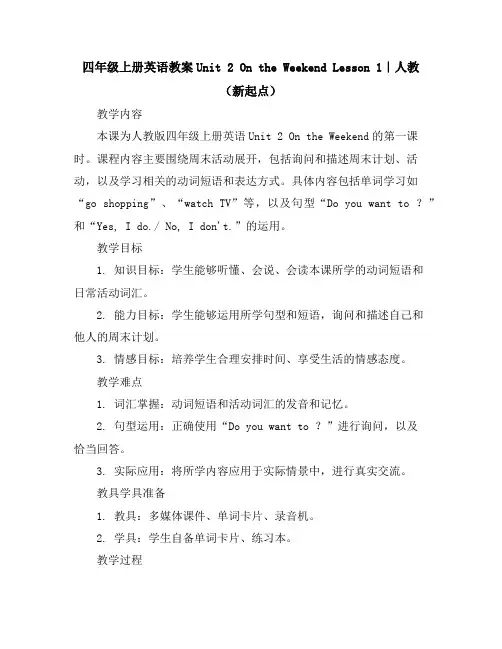
四年级上册英语教案Unit 2 On the Weekend Lesson 1|人教(新起点)教学内容本课为人教版四年级上册英语Unit 2 On the Weekend的第一课时。
课程内容主要围绕周末活动展开,包括询问和描述周末计划、活动,以及学习相关的动词短语和表达方式。
具体内容包括单词学习如“go shopping”、“watch TV”等,以及句型“Do you want to ?”和“Yes, I do./ No, I don't.”的运用。
教学目标1. 知识目标:学生能够听懂、会说、会读本课所学的动词短语和日常活动词汇。
2. 能力目标:学生能够运用所学句型和短语,询问和描述自己和他人的周末计划。
3. 情感目标:培养学生合理安排时间、享受生活的情感态度。
教学难点1. 词汇掌握:动词短语和活动词汇的发音和记忆。
2. 句型运用:正确使用“Do you want to ?”进行询问,以及恰当回答。
3. 实际应用:将所学内容应用于实际情景中,进行真实交流。
教具学具准备1. 教具:多媒体课件、单词卡片、录音机。
2. 学具:学生自备单词卡片、练习本。
教学过程1. 热身活动:播放英文歌曲,营造英语学习氛围。
2. 新课导入:展示图片,引导学生谈论周末活动。
3. 词汇教学:借助单词卡片,学习新词汇。
4. 句型练习:通过角色扮演,练习询问和描述周末计划。
5. 小组活动:分组讨论,设计周末计划。
6. 汇报展示:各小组汇报周末计划,全班交流。
板书设计板书设计简洁明了,突出本课重点词汇和句型。
通过图表、色块等方式,直观展示周末活动的安排和询问应答过程。
作业设计1. 书面作业:完成课后练习,巩固词汇和句型。
2. 口头作业:与家人或朋友用英语讨论周末计划。
3. 拓展作业:收集更多关于周末活动的词汇和表达方式。
课后反思课后反思将围绕教学目标达成度、教学方法的有效性、学生学习状态等方面进行。
教师将根据学生的反馈和学习效果,调整教学策略,以提高教学效果。
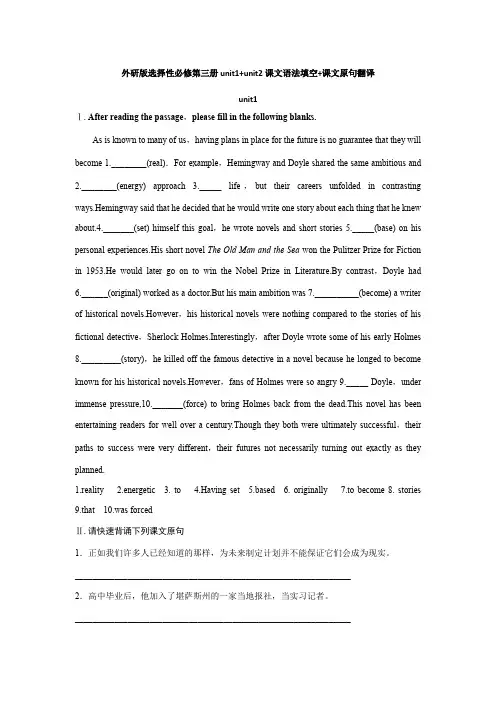
外研版选择性必修第三册unit1+unit2课文语法填空+课文原句翻译unit1Ⅰ.After reading the passage,please fill in the following blanks.As is known to many of us,having plans in place for the future is no guarantee that they will become 1.________(real).For example,Hemingway and Doyle shared the same ambitious and 2.________(energy) approach 3._____ life,but their careers unfolded in contrasting ways.Hemingway said that he decided that he would write one story about each thing that he knew about.4._______(set) himself this goal,he wrote novels and short stories 5._____(base) on his personal experiences.His short novel The Old Man and the Sea won the Pulitzer Prize for Fiction in 1953.He would later go on to win the Nobel Prize in Literature.By contrast,Doyle had 6.______(original) worked as a doctor.But his main ambition was 7.__________(become) a writer of historical novels.However,his historical novels were nothing compared to the stories of his fictional detective,Sherlock Holmes.Interestingly,after Doyle wrote some of his early Holmes 8._________(story),he killed off the famous detective in a novel because he longed to become known for his historical novels.However,fans of Holmes were so angry 9._____ Doyle,under immense pressure,10._______(force) to bring Holmes back from the dead.This novel has been entertaining readers for well over a century.Though they both were ultimately successful,their paths to success were very different,their futures not necessarily turning out exactly as they planned.1.reality2.energetic3. to4.Having set5.based6. originally7.to become8. stories9.that 10.was forcedⅡ.请快速背诵下列课文原句1.正如我们许多人已经知道的那样,为未来制定计划并不能保证它们会成为现实。
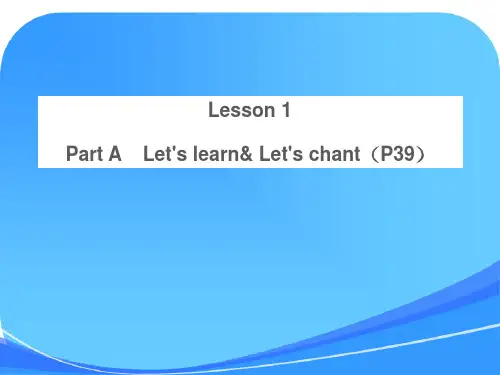
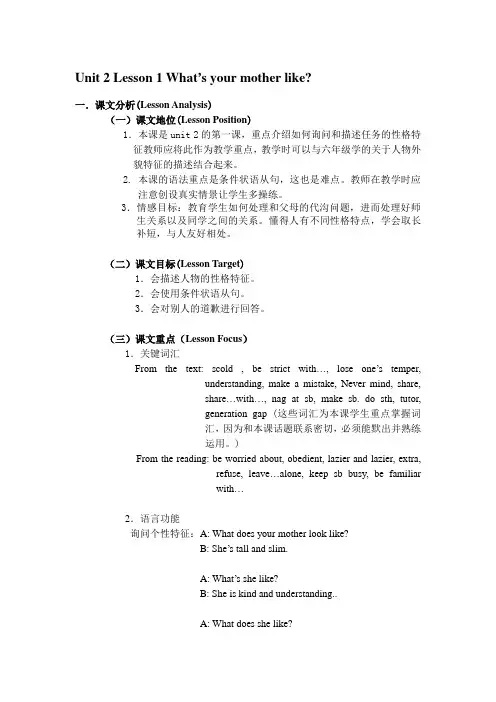
Unit 2 Lesson 1 What’s your mother like?一.课文分析(Lesson Analysis)(一)课文地位(Lesson Position)1.本课是unit 2的第一课,重点介绍如何询问和描述任务的性格特征教师应将此作为教学重点,教学时可以与六年级学的关于人物外貌特征的描述结合起来。
2.本课的语法重点是条件状语从句,这也是难点。
教师在教学时应注意创设真实情景让学生多操练。
3.情感目标:教育学生如何处理和父母的代沟问题,进而处理好师生关系以及同学之间的关系。
懂得人有不同性格特点,学会取长补短,与人友好相处。
(二)课文目标(Lesson Target)1.会描述人物的性格特征。
2.会使用条件状语从句。
3.会对别人的道歉进行回答。
(三)课文重点(Lesson Focus)1.关键词汇From the text: scold , be strict with…, lose one’s temper,understanding, make a mistake, Never mind, share,share…with…, nag at sb, make sb. do sth, tutor,generation gap (这些词汇为本课学生重点掌握词汇,因为和本课话题联系密切,必须能默出并熟练运用。
)From the reading: be worried about, obedient, lazier and lazier, extra,refuse, leave…alone, keep sb busy, be familiarwith…2.语言功能询问个性特征:A: What does your mother look like?B: She’s tall and slim.A: What’s she like?B: She is kind and understanding..A: What does she like?B: She likes music.对道歉的应答: Never mind.It doesn’t matter.3.语法要点:本课要学习的语法知识为:the adverbial clause of condition 二.教学设计(Teaching designs)[链接1]Teaching Materials: student’s book, workbook,some picturesProcedure :1.Turning in :show some picturesT: What is the boy doing?What will happen next?S: He is Walking to School, and he will be late for school.T: Yes. If he walks to school at 6:50 a.m ,he will be late for school. (注:先让他们跟读几遍,然后再让他们分析句子,根据以往的语法知识,他们可能会回答:主从复合句。
四年级下册一二单元知识点Unit 1 Lesson 1一、单词1. you 你,你们2. teacher 老师3. hello/hi 喂,你好4. your 你的,你们的5. name 名字6. friend 朋友7. pupil 小学生8. his 他的9. her 她的10. welcome 欢迎11. back 回来12. call 称呼,叫二、短语1. a new teacher 一位新老师2. a new friend 一位新朋友3. a new pupil 一位新学生4. very well 非常好三、句子1. Welcome back to school. 欢迎回到学校.2. You can call me Mr. Wood. 你们可以叫我伍德老师。
3. -Nice to meet you . 认识你很高兴。
-Nice to meet you, too. 认识你也很高兴。
4. He is a new pupil. 他是一位新学生。
5. These are my friends.这是我的朋友们。
6. His name is Danny. 他叫丹尼。
7. Her name is Kim. 她叫金。
8. -How are you? -Fine, thanks./ Very well, thank you.你好吗?我很好,谢谢。
Lesson 2一、单词1. pencil 铅笔2. pencil box 铅笔盒3. what 什么4. pen 钢笔5. ruler 直尺6. crayon 彩色蜡笔7. whose 谁的二、短语1. whose pencil 谁的铅笔2. Danny's pencil 丹尼的铅笔(某人的是在某人的后面加’s)三、句子1. Is this your pencil ?这是你的铅笔吗?肯定回答Yes, it is. 否定回答No, it isn't.2. Is it Steven's pencil ?它是史蒂芬的铅笔吗?肯定回答Yes, it is. 否定回答No, it isn't.3. It's not his pencil. 它不是他的铅笔。